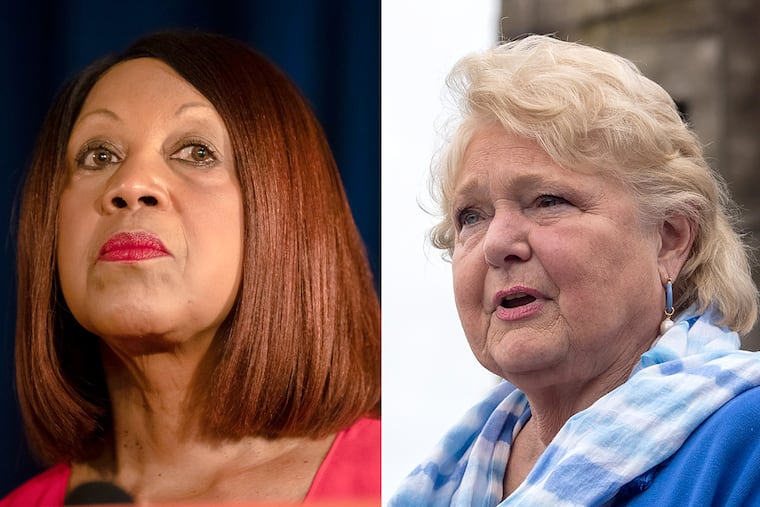Abortion, women, and white privilege: New Jersey’s lt. gov. debate covered plenty of ground
The face-off between New Jersey Lt. Gov. Sheila Oliver and Republican challenger Diane Allen — their only debate before the election — was much more civil than last week's gubernatorial debate.

There were no heated attacks, no rowdy audience, and even some common ground.
In their only debate before the Nov. 2 election, New Jersey Lt. Gov. Sheila Oliver and her Republican challenger, Diane Allen, on Tuesday night offered viewers a vastly different experience from the one many may have seen during the first debate last week for the two candidates atop the tickets. That event included nonstop clashes between Gov. Phil Murphy and GOP nominee Jack Ciattarelli.
Oliver and Allen’s hour-long debate, sponsored by the New Jersey Globe and held at Rider University, was more civil.
» READ MORE: Murphy, Ciattarelli clash in NJ gov race's 1st debate
Both have more experience in government than their running mates: Oliver was a school board member and Essex County commissioner, then served in the state Assembly, where she was speaker. Allen, the longtime Philadelphia news anchor, represented South Jersey as a state senator for two decades.
Most of their discussion centered on policy issues, and the candidates even took the same view once or twice, such as during a discussion on improving the quality of school lunches.
Here are some notable topics they discussed:
White privilege
Asked how she would define “white privilege,” Allen didn’t hesitate — a contrast to Ciattarelli’s response to a similar question from a caller during a radio appearance on WNYC last week. He declined to answer.
“I suppose white privilege is the fact that for many people who are white, we are able to accomplish things and do things thinking we’re doing it on our own, when in fact, perhaps we’re doing it because we’re being given a little leeway because of our color,” Allen said. “Most of us are probably not aware of that as it happens.” She added that kids should learn about slavery and the nation’s history, but that it should be done in a way that brings people together.
Oliver, who is Black and was born and raised in Newark, said white privilege was “historical in nature.”
“When New Jersey was founded and created, colonists were able to receive 140 acres of land if they were willing to settle in our colony,” she said. “That sets the tone for intergenerational wealth.”
Roe v. Wade
Both touched on abortion, a topic that has been again elevated as a campaign issue, due to the controversial Texas law banning the procedure after about six weeks and Murphy’s advocacy of the Reproductive Freedom Act, a bill on hold in the legislature that would codify access to abortion in New Jersey.
Oliver said she believed that bill would become law, saying it had broad support.
“There is no turning back as it relates to Roe v. Wade,” she said.
Allen said that the Texas law is too restrictive but that the freedom act is too lenient. It’s a theme Ciattarelli has campaigned on as well, saying many Democrats don’t support late-term abortions.
“This law in New Jersey, were it to pass, would mean that you not only could have abortions during the first six months, but you could have an abortion in the seventh, the eighth, or the ninth month, right up until the day a child is born,” Allen said.
Such abortions are rare. Nationally, abortions performed after 21 weeks made up about 1% of procedures performed in 2018, according to the Centers for Disease Control and Prevention.
Murphy and women
The governor’s record on women has for months been targeted by Allen and Ciattarelli, who cite the scandals over alleged behavior by male staffers that emerged from his 2017 campaign, and pervasive abuse at the soon-to-be-closed Edna Mahan women’s prison in Hunterdon County.
Oliver said that she had known several governors but that Murphy is the only one who has brought women to the table on a regular basis for major decisions.
“Half of our cabinet is comprised of women. Women holding very important and prestigious positions. Women who are able to take their departments in a number of different directions,” she said. “That didn’t exist in other gubernatorial administrations. You had to, like, call daddy to ask. That doesn’t happen in a Murphy administration.”
Allen retorted: “But if there’s an issue, and the woman has a problem, he’s nowhere to be found.”